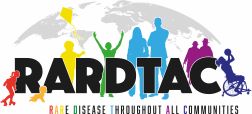IMPaCCT_study
IMPaCCT Study - investigating the impact of COVID-19 on caregivers and patients
Caregivers and patients are describing a major impact of COVID-19 on their lives. Help us to identify the impact that this pandemic has had, and continues to have, on patients and their carers, with a focus on cancer and rare diseases.
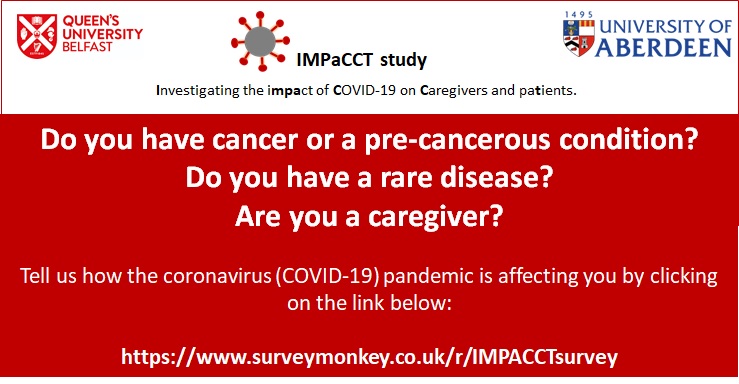
July 2020 update: we have closed the rare disease component of this survey for the first batch of full data analysis.
Many thanks to everyone who contributed their thoughts, experiences and ideas of how COVID-19 is impacting our rare disease communities.
We are drafting a manuscript describing these results with a view to submitting for publication later this month.
Individual reports requested by specific charities may be read here.
Mid May 2020 update: interim findings
In the interests of sharing as much information as early as possible, we have conducted an interim analysis on a subset of data and presented those results to the Northern Ireland Rare Disease Partnership in the first instance. These interim findings are freely available: IMPaCCT_RareDisease. While some people living with rare diseases highlighted that social distancing provided an opportunity to get jobs done and learn new hobbies, other people explained it was no different to the normal day-to-day isolation they experience with their rare disease. More negative responses included the majority of respondents concerned about their jobs and finances, lack of understanding about COVID-19 guidelines for clinically vulnerable individuals, significantly increased caring responsibilities / needs, decreasing independence, difficulties sourcing essential PPE, medicines, and groceries, challenges interacting with medical professionals and decreased access to medical and social care, as well as concerns about the restrictions due to COVID-19 lifting. 15 people said that COVID-19 had a positive impact on their lives, with 79 reporting no change, and 180 describing a negative impact.
The interim analysis was possible with input from Ashleen Crowe, Julie McMullan, Charlene McShane, Lesley Anderson, Olinda Santin and AJ McKnight.
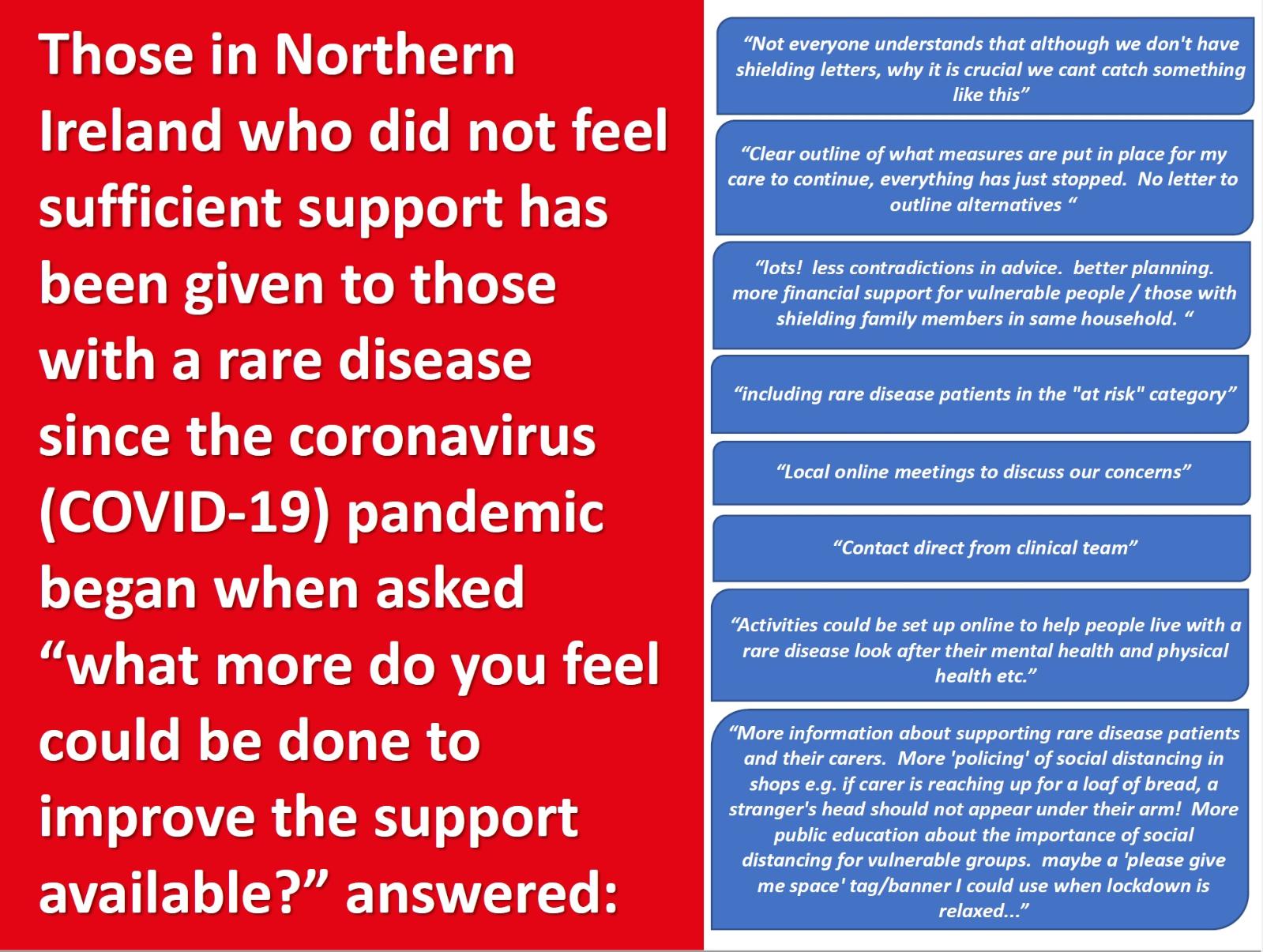
Inital invitation to participate
Researchers at Queen’s University Belfast and the University of Aberdeen, invite you to take part in an online research study investigating the impact of the COVID-19 (coronavirus) pandemic on caregivers and patients with cancer, pre-cancerous conditions and rare diseases.
COVID-19 (a coronavirus) is an infectious disease caused by a virus. COVID-19 was first identified in patients in Wuhan province in China at the end of 2019. From there the virus has spread to other countries worldwide with the World Health Organisation declaring it a pandemic on 12th March 2020. This virus has had a major impact on many people with anecdotal reports suggesting patients and carers are often struggling to manage. We are particularly interested in hearing views from people living or working with cancer, pre-cancerous conditions, and / or rare diseases.
QR code for a quick link to the survey
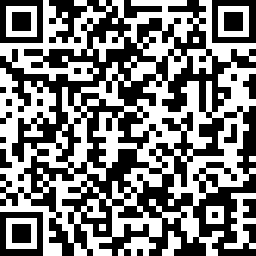
For people with a rare disease: PLEASE have your experiences counted by completing this survey: https://www.surveymonkey.co.uk/r/IMPACCTsurvey
Rare diseases are defined by the European Union as those individually affecting fewer than 1 in 2,000 individuals, cumulatively affecting 1 in every 17 persons at some point in their lives. It is estimated that 350 million people globally have a rare disease with more than 8,000 rare diseases recorded in the literature. We know that being diagnosed with a rare disease can lead to a significantly reduced lifespan and quality of life for patients and their families; accurate diagnosis and early intervention significantly improves long term outcomes for rare disease patients. Many individuals with a rare disease will regularly attend more than 5 medical professionals; many of these consultations have been delayed as a result of health and social care measures implemented for coronavirus. Access to clinical trials and medications has been severely curtailed in recent weeks. Individuals living and working with rare diseases consistently describe challenges accessing accurate information about individual rare diseases and accessing appropriate services (); anecdotally this has been exacerbated in recent weeks due to the coronavirus (COVID-19) pandemic. Individuals living with rare conditions often describe feeling ‘isolated’ and ‘dismissed’ so effective communication and provision of information is critical.
We are keen to hear your views on how COVID-19 is impacting your day-day life.
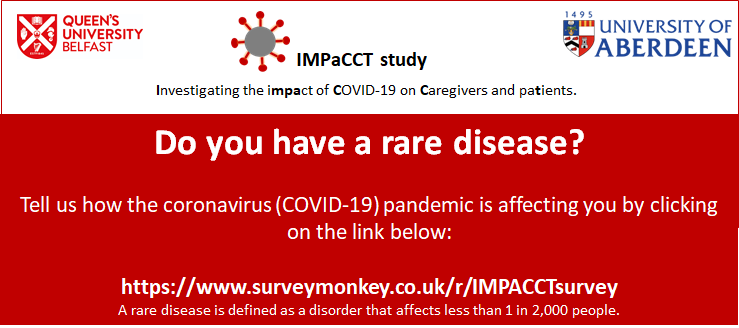
Caregivers of people with a rare disease: PLEASE have your experiences counted by completing this survey: https://www.surveymonkey.co.uk/r/IMPACCTsurvey
Many patients with rare diseases require support from formal and informal caregivers. Recent research by our team has revealed that carers often do not prioritise themselves and consequently find themselves in difficult circumstances when others are depending on them for care needs (McMullen et al., unpublished). We have developed a cross-sectional support leaflet for carers of people with a rare disease (). In the midst of this coronavirus (COVID-19) pandemic, carers have voiced a number of concerns to the research group including where to get specific support and information, financial concerns, psychosocial concerns, ensuring patients have sufficient care they need at this time, and having appropriate provision of personal protective equipment.
We are keen to hear your views on how COVID-19 is impacting your day-day life.
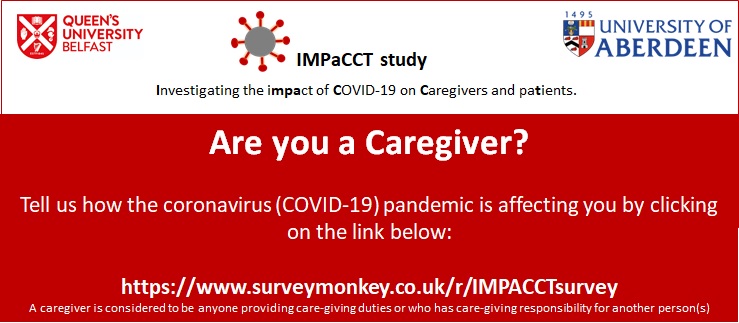
The study was reviewed and approved by the Queen’s University of Belfast, MHLS Faculty Research Ethics Committee (MHLS 20_52).
Led by Prof Lesley Anderson (with a focus on cancer), and Dr Charlene McShane (with a focus on pre-cancerous conditions), the survey also includes information about rare diseases (led by Dr AJ McKnight) and those who provide care for them (led by Dr AJ McKnight & Dr Olinda Santin).
For more information please contact us

